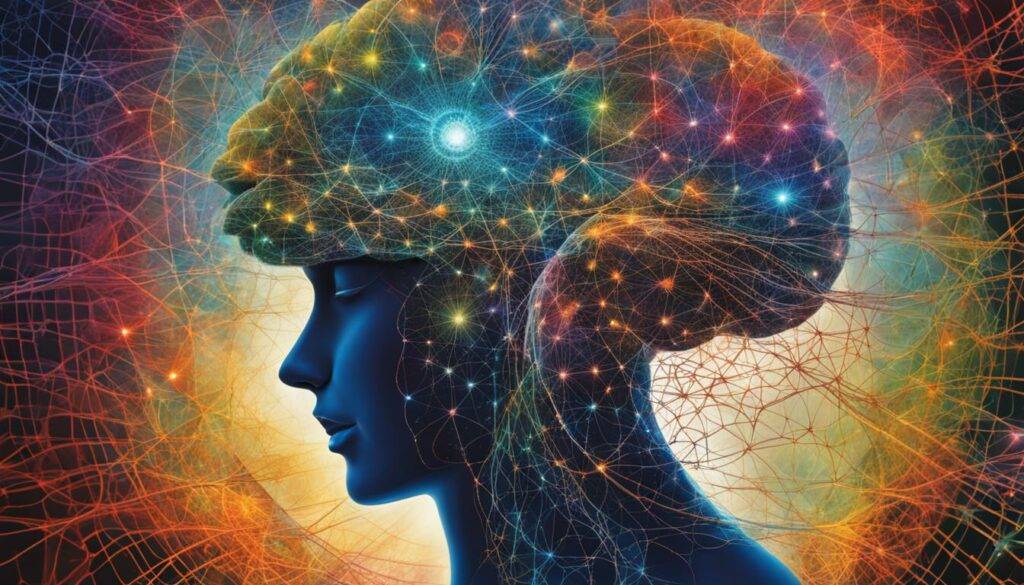Consciousness, the essence of our being, is a captivating enigma that has intrigued scientists, philosophers, and seekers of truth for centuries. It is the subjective experience of being aware, encompassing our thoughts, feelings, and perceptions.
Yet, the true nature of consciousness and how it emerges from the intricate workings of the brain remains shrouded in mystery.
As you embark on this journey of understanding consciousness, you will delve into the depths of the human mind and explore the profound capabilities that lie within.
From the intricate interplay of consciousness and the mind to the mysteries of perception and self-awareness, each step brings you closer to unraveling the secrets that consciousness holds.
Are you ready to reveal the hidden intricacies of your own existence? Let’s begin our exploration of consciousness and embark on a quest to unlock the transformative power that lies within.
Key Takeaways:
- The true nature of consciousness is still not fully understood, sparking intense scientific and philosophical inquiry.
- Consciousness is the subjective experience of being aware, encompassing thoughts, feelings, and perceptions.
- Understanding the interplay between consciousness and the mind is crucial in unraveling the mysteries of human existence.
- Perception and self-awareness are integral components of consciousness, enabling us to perceive reality and recognize ourselves within it.
- Exploring consciousness holds the potential to unlock untapped capabilities and transform our understanding of the world and ourselves.
The Conscious Mind: Interpreting Experience
The conscious mind plays a vital role in our understanding of the world around us. It is responsible for capturing and interpreting every experience we have, allowing us to make sense of our reality.
Through conscious awareness, we are able to process sensory information, generate thoughts and feelings, and have a sense of self-awareness.
The exact mechanisms by which the conscious mind operates are still a subject of ongoing research and exploration. The scientific and philosophical communities have put forth various theories to explain how interpretation of experience takes place.
One notable theory, proposed by philosopher William James, suggests that our conscious experiences shape three distinct “selves” in our empirical self – material, social, and spiritual.
Neuroscientists have also been making significant progress in identifying the specific brain regions involved in consciousness. By studying sensory input and neural processes, they aim to uncover the intricate workings of conscious awareness.
Although the complete understanding of the conscious mind eludes us, these scientific advancements bring us closer to unraveling its complexities.
The image above visually represents the intricate relationship between consciousness and the mind, highlighting the profound impact it has on our daily lives.
The Mystery of Consciousness: Perception and Self-Awareness
Consciousness encompasses the remarkable ability to perceive and recognize both the external world and oneself within it. It grants us the extraordinary gift of being aware of sensory information from our environment and fosters a sense of self-identity.
While commonly associated with humans, consciousness is not exclusive to our species. The Cambridge Declaration on Consciousness, signed by a group of esteemed Cambridge scientists, acknowledges that consciousness also exists in other animals.
Neuroscience studies have unveiled invaluable insights into the specific neural circuits and processes responsible for our capacity to perceive and be self-aware. However, the exact mechanisms underlying consciousness remain extraordinarily complex and require further investigation.
In our quest to comprehend consciousness, we are driven to explore the boundless depths of our own perception and self-awareness. By unraveling this enigma, we aim to decipher the profound mysteries of reality and recognize ourselves within the tapestry of existence.

As we navigate through life, our consciousness serves as a conduit through which we perceive and interpret the vast intricacies of the world around us. It allows us to make sense of our surroundings, process sensory stimuli, and create a subjective experience of reality.
Through consciousness, we have the power to engage with our environment, understand its nuances, and unravel the profound significance of existence.
Recognizing oneself
Within the realm of consciousness, we encounter the extraordinary ability to recognize and introspect upon our own being. Self-awareness emerges as we cultivate a deep understanding of our thoughts, emotions, and perceptions.
It is through self-awareness that we gain insights into our own identity, desires, and aspirations. This profound recognition of oneself is an essential aspect of the human experience, enabling personal growth, introspection, and the pursuit of fulfillment.
| Aspect | Consciousness and Perception | Consciousness and Self-Awareness |
|---|---|---|
| Definition | Ability to perceive and interpret sensory information from the external world | Awareness of one’s thoughts, emotions, and identity |
| Importance | Allows us to interact with and understand our environment | Enables personal growth and introspection |
| Scope | Expands our understanding of reality | Enhances our knowledge of ourselves |
| Complexity | Requires the integration of sensory input and neural processes | Involves introspection and self-reflection |
The Science behind Consciousness
Neuroscience plays a crucial role in unraveling the science behind consciousness. Researchers have explored the neural correlates of consciousness, aiming to identify specific brain regions and patterns of activity associated with conscious experiences.
The integrated information theory proposed by neuroscientist Giulio Tononi suggests that consciousness arises from the brain’s ability to integrate information.
According to this theory, consciousness is not simply the result of individual brain regions working in isolation, but rather emerges from the complex interplay of neural networks.
Studies of brain injuries and disorders have provided valuable insights into the neural basis of consciousness. For example, damage to the reticular activating system, a network of interconnected brain structures responsible for regulating arousal and attention, can result in disturbances of consciousness.

While neuroscience has made significant progress in understanding the mechanisms underlying consciousness, the fundamental question of how and why subjective experience arises from physical processes still remains unanswered.
The intricate relationship between the brain and consciousness continues to captivate scientists and philosophers alike, driving further exploration, research, and debate.
Consciousness and Philosophy: Bridging the Explanatory Gap
Throughout history, philosophy has been intrinsically linked to the exploration of consciousness. From ancient Greek philosophers like Aristotle and Plato to contemporary thinkers, the intricate nature of consciousness has been a focal point of philosophical inquiry.
These profound thinkers pondered upon the human capacity for self-awareness, introspection, and the subjective experience of consciousness.
One notable philosopher, René Descartes, proposed the concept of mind-body dualism, positing that consciousness existed within the pineal gland. This idea sparked intriguing debates about the relationship between the physical body and subjective experience.
In modern philosophy, the “hard problem of consciousness” put forth by David Chalmers delves into the challenge of understanding how and why physical processes in the brain give rise to subjective experiences.
It highlights the perplexing gap between the objective nature of brain processes and the subjective realm of consciousness.
As philosophical inquiries into consciousness persist, researchers aim to bridge this explanatory gap. The quest to understand the relationship between subjective experience and objective brain processes remains a crucial area of exploration.
Ancient Greek Philosophy and Consciousness
“The unexamined life is not worth living.”
– Socrates
Ancient Greek philosophers, renowned for their intellectual curiosity, embarked on a deep exploration of consciousness. Plato, in his dialogue “Phaedrus,” investigated the idea of self-awareness and knowledge as a form of remembering.
Aristotle, on the other hand, pondered the essence of consciousness and its connection to human perception and reasoning.
The Hard Problem of Consciousness
The hard problem of consciousness alludes to the difficulty in explaining how and why certain arrangements of matter in the brain give rise to subjective experiences. It raises profound questions regarding the nature of consciousness and its relationship to the physical world.
The exploration of this problem delves into the very essence of what it means to be conscious.
Subjective Experience and Brain Processes
The study of subjective experience and brain processes aims to unravel the intricate mechanisms underlying consciousness.
Researchers seek to identify neural correlates associated with subjective experiences, investigating the intricate interplay between brain activity and conscious awareness. Understanding this relationship is vital to unlocking the mysteries of consciousness.
| Philosophical Perspective | Key Insights |
|---|---|
| Aristotelian Philosophy | – Explores the connection between consciousness, perception, and human reasoning – Considers consciousness as essential to our understanding of the world – Contemplates the nature of self-awareness and its role in conscious experience |
| Descartes’ Dualism | – Proposes the separation of mind and body, with consciousness residing in the pineal gland – Sparks debates about the relationship between physical processes and subjective experiences |
| Chalmers’ Hard Problem | – Explores the challenge of explaining subjective experiences from an objective, physical standpoint – Questions the ability of current scientific models to fully account for the human mind – Highlights the need for a deeper understanding of the subjective nature of consciousness |
Conclusion
Understanding consciousness is a lifelong pursuit that continues to intrigue scientists, philosophers, and seekers of knowledge. The enigma of consciousness, with its intricate mysteries and profound implications, captivates our minds and drives us to explore the depths of the human mind.
Through decades of research and exploration, we have made remarkable strides in unlocking the secrets of consciousness.
Scientists and philosophers from various disciplines have proposed theories and perspectives, providing valuable insights into the nature of consciousness. However, the ultimate quest to fully comprehend its true essence and origins remains an ongoing challenge.
As neuroscience advances and philosophical inquiries persist, we stand on the precipice of a new frontier in our exploration of consciousness. With each discovery and realization, we come closer to unraveling the magnificent enigma and gaining a deeper understanding of the profound capabilities of the human mind.
By embracing further exploration and research, we have the potential to unlock the full spectrum of consciousness and tap into the infinite possibilities of our own existence.
FAQ
What is consciousness?
Consciousness refers to the subjective experience of being aware and having thoughts, feelings, and perceptions.
How is consciousness related to the mind?
Consciousness is responsible for capturing and interpreting everything we experience and is closely associated with the mind.
What is the role of consciousness in perception and self-awareness?
Consciousness enables us to perceive and recognize both the external world and ourselves within it, giving us a sense of self-awareness.
What are the scientific explanations behind consciousness?
Scientists explore the neural correlates of consciousness and propose theories such as the integrated information theory to explain its mechanisms.
How does philosophy contribute to our understanding of consciousness?
Philosophical inquiries into consciousness have explored the subjective nature of conscious experience and the challenge of explaining its relationship with brain processes.
Are there any definitive answers to the mystery of consciousness?
Despite extensive research, the true nature and origins of consciousness remain elusive, and a comprehensive explanation has not been found yet.




























































